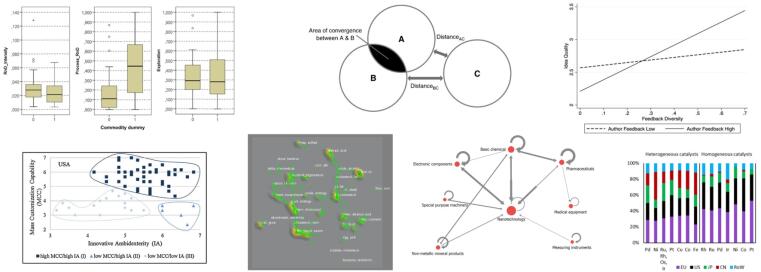
Innovations- und Technologiemanagement
Ein Forschungsschwerpunkt unseres Institut ist Technologie- und Innovationsmanagement in der chemischen Industrie und verwandter Branchen. Ein Fokus liegt dabei auf dem Zusammenspiel von Produkt- und Prozessinnovationen und dem Management der frühen Phasen des Innovationsprozesses.[1,2]
Ein weiterer Fokus liegt auf der Untersuchung von Kooperationen und insbesondere dem Wissens- und Technologietransfer.[3,4] Forschung in diesem Bereich hat beispielsweise neue Erkenntnisse zur Messung von technologischer Distanz [5], der Digitalisierung in Prozessindustrien [6] und dem Management von Open Innovation [7,8] geliefert.
Zu den methodischen Kompetenzen des Instituts gehört die Analyse von Patenten. Unser Team ist beispielsweise ein Pionier in der Entwicklung neuer Methoden zur Früherkennung konvergierender Industrien [9-11] und hat diese über die Jahre weiterentwickelt [12,13]. Ergebnisse unserer Patentanalysen wurden außerdem genutzt, um ein besseres Verständnis von Technologietrends und der Wissenslandschaft in verschiedenen Technologiefeldern zu erlangen.[14-16]
[1] Bauer, M., & Leker, J. (2013). Exploration and exploitation in product and process innovation in the chemical industry. R&D Management, 43(3), 196-212.
[2] Zhu, H., Kock, A., Wentker, M., & Leker, J. (2019). How does online interaction affect idea quality? The effect of feedback in firm‐internal idea competitions. Journal of Product Innovation Management, 36(1), 24-40.
[3] Niedergassel, B., & Leker, J. (2011). Different dimensions of knowledge in cooperative R&D projects of university scientists. Technovation, 31(4), 142-150.
[4] Grosse Kathoefer, D., & Leker, J. (2012). Knowledge transfer in academia: an exploratory study on the Not-Invented-Here Syndrome. Journal of Technology Transfer, 37, 658-675.
[5] Vom Stein, N., Sick, N., & Leker, J. (2015). How to measure technological distance in collaborations—The case of electric mobility. Technological Forecasting and Social Change, 97, 154-167.
[6] Aaldering, L. J., & Song, C. H. (2021). Of leaders and laggards-Towards digitalization of the process industries. Technovation, 105, 102211.
[7] Herzog, P., & Leker, J. (2010). Open and closed innovation–different innovation cultures for different strategies. International Journal of Technology Management, 52(3/4), 322-343.
[8] Ahlfänger, M., Gemünden, H. G., & Leker, J. (2022). Balancing knowledge sharing with protecting: The efficacy of formal control in open innovation projects. International Journal of Project Management, 40(2), 105-119.
[9] Curran, C. S., Bröring, S., & Leker, J. (2010). Anticipating converging industries using publicly available data. Technological Forecasting and Social Change, 77(3), 385-395.
[10] Curran, C. S., & Leker, J. (2011). Patent indicators for monitoring convergence–examples from NFF and ICT. Technological Forecasting and Social Change, 78(2), 256-273.
[11] Preschitschek, N., Niemann, H., Leker, J., & G. Moehrle, M. (2013). Anticipating industry convergence: semantic analyses vs IPC co-classification analyses of patents. Foresight, 15(6), 446-464.
[12] Song, C. H., Elvers, D., & Leker, J. (2017). Anticipation of converging technology areas—A refined approach for the identification of attractive fields of innovation. Technological Forecasting and Social Change, 116, 98-115.
[13] Sick, N., Preschitschek, N., Leker, J., & Broering, S. (2019). A new framework to assess industry convergence in high technology environments. Technovation, 84, 48-58.
[14] Elvers, D., Song, C. H., Steinbüchel, A., & Leker, J. (2016). Technology trends in biodegradable polymers: evidence from patent analysis. Polymer Reviews, 56(4), 584-606.
[15] Stoffels, M. A., Klauck, F. J., Hamadi, T., Glorius, F., & Leker, J. (2020). Technology trends of catalysts in hydrogenation reactions: a patent landscape analysis. Advanced Synthesis & Catalysis, 362(6), 1258-1274.
[16] Aaldering, L. J., Leker, J., & Song, C. H. (2019). Competition or collaboration?–Analysis of technological knowledge ecosystem within the field of alternative powertrain systems: A patent-based approach. Journal of Cleaner Production, 212, 362-371.

